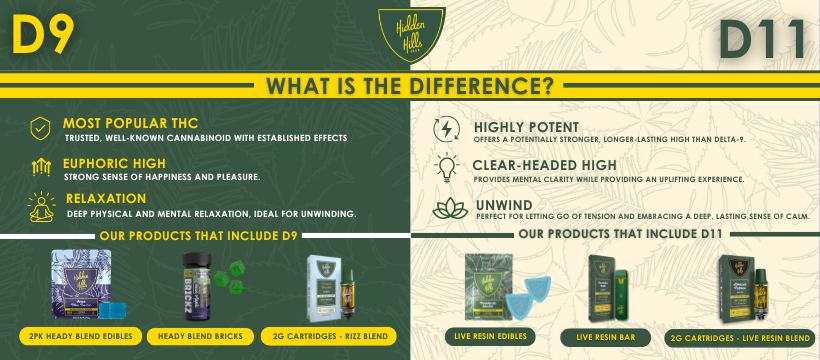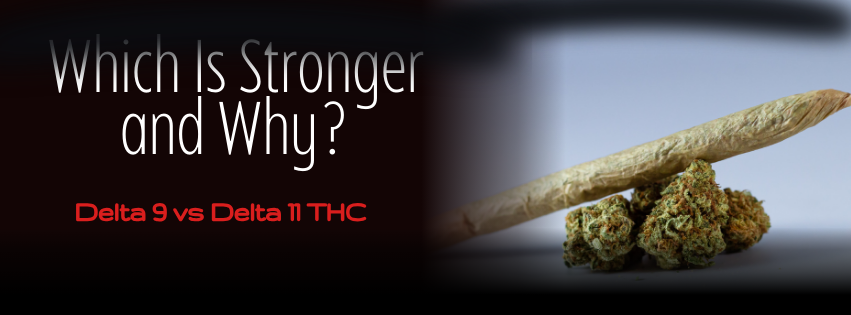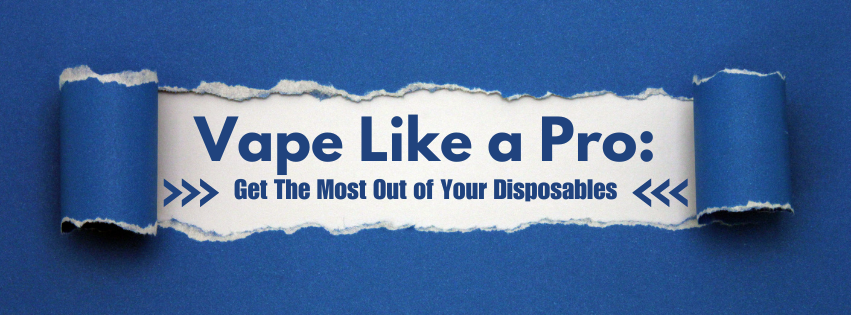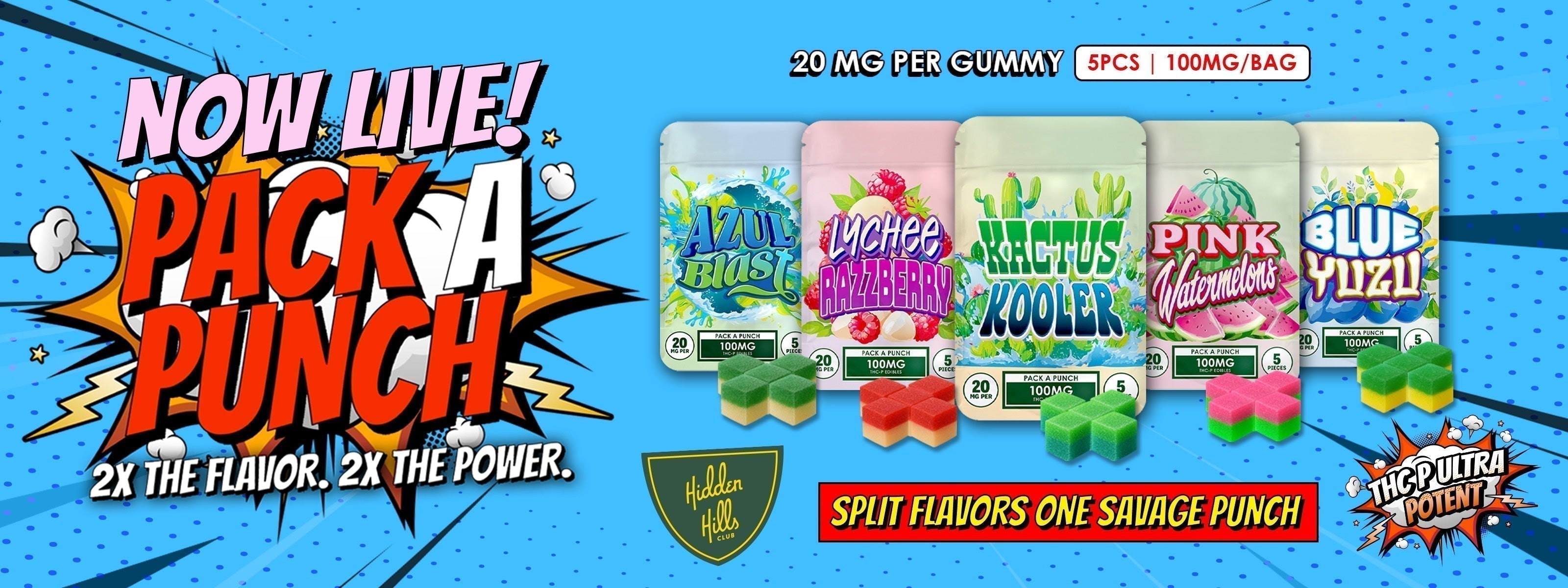What is the difference between D11 and D9?

In the rapidly evolving world of cannabis, new cannabinoids often steal the spotlight, sparking curiosity and excitement among enthusiasts and newcomers. One of the latest to grab attention is Delta 11, a cannabinoid that’s making waves for its powerful effects. But how does it compare to the well-known Delta 9, the cannabinoid responsible for the classic euphoric high? Let’s dive into the Delta 9 vs. Delta 11 comparison to understand their differences.
Delta 11 is known for being more potent than Delta 9, meaning it can produce stronger effects and euphoria with potentially lower doses. This higher potency allows Delta 11 to deliver a psychoactive experience similar to Delta 9, but with an added intensity that sets it apart. For those seeking a more powerful sensation, Delta 11 may be the ideal choice.
Join us as we break down the distinct qualities of Delta 9 and Delta 11, guiding you through what makes each cannabinoid unique. From their effects to their potency, we’ll explore how these cannabinoids stack up, uncovering new insights and experiences that might surprise you. Keep reading to discover the fascinating world of Delta 11 vs. Delta 9 and what it could mean for your cannabis journey.
What Is Delta 11?
Delta 11 THC is a rare cannabinoid naturally found in the cannabis plant that has recently gained attention among cannabis enthusiasts. Early research and anecdotal evidence suggest that Delta 11 may produce intense euphoria and is reportedly three times stronger than THC due to its high binding affinity to the body’s endocannabinoid system (ECS). While scientists are still studying its full effects, Delta 11 products are starting to emerge on the market, derived from hemp to comply with federal law. Consumers are excited about its potential to relieve discomfort, reduce stress, and enhance sensory experiences.
What Is Delta 9?
Delta 9 THC is the main psychoactive compound in cannabis, responsible for the typical "high" associated with marijuana. It is also found in hemp plants but in very low concentrations, usually 0.3% or less. Like Delta 11, Delta 9 interacts with cannabinoid receptors in the body’s endocannabinoid system (ECS), affecting various physiological processes. Delta 9’s role in the cannabis industry is significant, from plant cultivation to product marketing. Researchers are interested in its potential to boost creativity, relieve discomfort, and regulate appetite, among other effects.
Is delta 11 more potent than delta 9?
Though Delta 11 is a relatively new kid on the cannabis block, it's already making waves—and for good reason. It’s rumored to pack a punch that's up to three times stronger than Delta 9 THC. That means if you're looking for a more intense experience, Delta 11 might just be your new go-to. But don’t worry, despite its potency, the effects aren't as overwhelming as you might think. Thanks to its unique interaction with the body, Delta 11 offers a more controlled high, often described as clearer and more relaxing than Delta 9.
With emerging research and user feedback, Delta 11 is shaping up to be a game-changer, especially for those seeking therapeutic relief. Many users rave about its ability to offer effective relief for certain conditions, and they’re loving the enhanced clarity and relaxation it brings. While there’s still a lot to learn about Delta 11, it’s definitely an exciting development in the world of cannabinoids—just remember, tread lightly until more research rolls in!
Can Delta 11 get you high?
Yes, Delta 11 THC is psychoactive and can produce a high. The intensity depends on factors like dosage, user tolerance, and consumption method. Although similar to other THC compounds, Delta 11 offers a unique experience. Discovered in the 1970s, it’s often described as delivering a more mellow high, similar to Delta 8, with effects like relaxation and euphoria. Despite its pause in research, Delta 11 is believed to be nearly three times stronger than traditional THC. When smoked or vaped, effects hit within minutes, lasting 2-3 hours, while edibles may take longer but last up to 6-8 hours.
Does Delta 9 get you stoned?
Delta-9 THC is the heavyweight champ of cannabinoids, and it’s the one responsible for getting you blissfully high. After you indulge in some cannabis, you might notice your sense of time getting a little funky—suddenly, five minutes can feel like an eternity! The buzz from Delta 9 typically hangs around for about 2 to 10 hours, depending on how you consume it. If you’re inhaling, the effects kick in faster, peak quickly, and then wave goodbye in a few hours. On the flip side, if you opt for edibles, be prepared for a longer wait—those can keep you soaring for up to 10 hours! As for dosages, most folks find that somewhere between 5mg and 25mg of Delta 9 THC does the trick. But if you’re a seasoned pro with a high tolerance, you might need a hefty 25mg to 50mg dose just to feel the love!
Is Delta 11 federally legal?
Delta 11-THC is legal under federal law, whereas Delta 9-THC is classified as illegal at the federal level and remains prohibited in many states. Both Delta 9-THC and Delta 11-THC induce euphoric psychoactive effects and are believed by some to possess medicinal properties. While Delta 11-THC is federally legal, the legality can vary at the state level due to differing hemp regulations. For Delta 11-THC to be legal in a particular state, that state must have legalized hemp in a manner consistent with federal guidelines, and state law must exclude hemp derivatives from the list of Controlled Substances.
Is delta 9 federally legal?
Under federal law, Delta 9 THC is categorized as a Schedule I substance, rendering it illegal throughout the United States. However, hemp-derived Delta 9 THC is permitted under federal regulations, provided it contains less than 0.3% Delta 9 THC on a dry-weight basis. The legalization of specific THC products was made possible by the Farm Bill, which focuses on food, agriculture, and nutrition. Enacted in 2018, the Farm Bill legalized hemp production and created a loophole for the manufacturing and sale of Delta 9 THC products.
What are the effects of d11?
- Euphoric High: Delta 11 produces an uplifting, euphoric sensation, similar to Delta 9 THC, but often described as smoother and more clear-headed.
- Relaxation: D11 provides a calming, body-focused effect, helping users to feel relaxed and at ease, ideal for unwinding.
- Increased Focus: Some users report heightened focus and mental clarity, making it suitable for daytime use.
- Mild Psychoactivity: While psychoactive, D11 tends to be less intense than Delta 9, offering a more manageable and controlled experience.
- Appetite Stimulation: Like other THC variants, D11 can increase appetite, often referred to as the “munchies.”
What are the effects of d9?
- Euphoria: Delta 9 THC typically induces a strong sense of happiness, relaxation, and an uplifted mood.
- Altered Perception: Users may experience changes in sensory perception, including heightened visual and auditory sensations.
- Increased Appetite: Known for causing the “munchies,” Delta 9 can significantly stimulate appetite.
- Anxiety or Paranoia: In higher doses, some users may experience anxiety or paranoia, depending on their tolerance and environment.
- Pain Relief: Delta 9 is often used for its ability to reduce pain, inflammation, and discomfort.
Differences in Chemical Structure of D9 and D11
Delta 11 and Delta 9 THC have a similar chemical structure, but a key difference affects how they interact with the body. The difference comes down to the position of a double bond in their carbon chains. In Delta 9, the bond is on the ninth carbon atom, while in Delta 11, it’s on the eleventh. This small change leads to differences in how each affects the body, their strength, and their potential benefits. Delta 11's structure suggests it might connect better to cannabinoid receptors, possibly making it more potent than Delta 9.
Is delta 9 or 11 better?
Delta 9 and Delta 11 both bring something to the table for cannabis lovers, each with their own unique perks. Delta 9 is the classic, delivering that euphoric high, altered perception, and a hefty dose of mental stimulation. It’s a go-to for boosting appetite, easing discomfort, and just feeling good overall. Delta 11, however, is like Delta 9’s bolder cousin—packing an even stronger punch of euphoria. While research is still catching up, early buzz suggests D11 could be a great stress-buster, mood-lifter, and might even offer a fresh sensory twist. It’s a whole new level of enjoyment, opening up exciting possibilities in the world of cannabis.
Delta 11 vs Delta 9 – Which One Is Right for Me?
Deciding between Delta 11 and Delta 9 THC comes down to a few key factors, like personal preference, the effects you’re after, and legal restrictions. If you’re after the classic cannabis experience, Delta 9 might be your go-to. But if you’re up for trying something new and possibly stronger, Delta 11 could be more your style. Whichever you choose, it’s smart to start with a low dose and adjust gradually based on how you feel. Ultimately, finding the right cannabinoid is all about personal experience and figuring out what works best for you.
D11 vs D9 - What Are the Main Differences?
Delta 11 is a powerful new addition, offering a more intense euphoria compared to the well-known effects of Delta 9. While many cannabis users are familiar with the euphoric highs of THC, Delta 11 has the potential to be up to three times stronger. The key difference lies in their molecular structures and how they interact with the body’s endocannabinoid system (ECS). Delta 11 binds more strongly to ECS receptors, which is why it delivers a more powerful high than traditional THC. Whether you're curious about Delta 11 or prefer Delta 9’s classic effects, it’s important to use cannabis responsibly. Always start with a small dose and increase slowly, especially with Delta 11, as its effects are much more potent.



